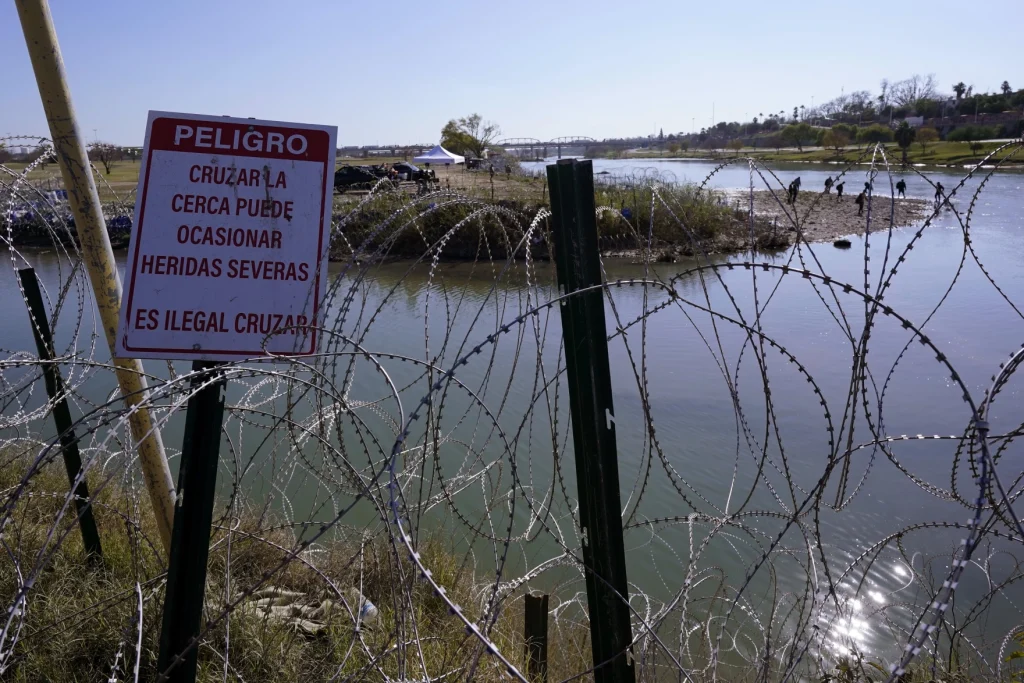Texas is arguably the most prepared – and eager – state to carry out President-elect Donald Trump’s immigration and border enforcement plans.
From expanding buoy barriers to bussing migrants across the country, state leaders have spent the last three and a half years building the legal and physical infrastructure that could ease the federal government’s efforts to carry out Trump’s mass deportation strategy.
Just last week, the Texas General Land Office offered Trump 1,400 acres of state-owned land near Rio Grande City to build immigrant detention facilities. In a letter to Trump, shared on the GLO’s website, Land Commissioner Dawn Buckingham confirmed her office is ready to partner with the federal government.
“We are more than happy to offer our resources to facilitate these deportations,” Buckingham wrote.
Since President Biden’s inauguration, Governor Greg Abbott has poured billions into his immigration enforcement initiative, Operation Lone Star, and stationed hundreds of state troopers at the border. The plan has included the installation of razor wire, floating marine barriers to prevent crossings, and bussing tens of thousands of migrants to blue states.
Abbott’s office also created three funds to collect donations for border transportation, the border wall, and border security. He appointed a border czar to advise him directly on these issues.
Texas officials, including Abbott and Attorney General Ken Paxton, did not respond to interview requests.
However, Chris Olivarez, a spokesperson for the Texas Department of Public Safety, recently told Fox News that Trump will likely adopt Texas’ strategies once in office.
“We’re still going to maintain our posture,” Olivarez said. “We’re going to remain proactive in what we’re doing. And I’m sure the current administration’s going to rely on Texas helping them carry out their policies.”
Increased focus on security
Texas, with its long border with Mexico, frequently leads the nation in annual migrant border encounters, although the numbers have decreased in 2024.
Clint McDonald, a retired sheriff and now director of the Texas and Southwestern Border Coalition, said most sheriffs along the border are eager to cooperate with the new administration. However, he cautioned that they are not immigration officers and lack the budget for full-scale border enforcement. If state leaders want them to take a more proactive role, McDonald stressed that the state would need to fund it.
“It’s a very touchy situation where our sheriffs want to do everything they can, but at the same time they’ve got to look at what the budget will allow them to,” he told The Texas Newsroom.
Joshua Treviño, Chief Transformation Officer at the Texas Public Policy Foundation, one of the state’s most influential conservative think tanks, said it’s still too early to predict exactly how things will unfold once Trump takes office. But he was certain it would be intense.
“There’s going to be a lot of deportations, and there’s going to be a greater focus on border security,” Treviño said.
When Texas lawmakers meet again in January, they will likely pass new laws to facilitate more state and federal cooperation on border issues.
David Spiller, a representative from rural North Texas, has introduced several such bills. One proposes harsher penalties for crimes committed by individuals who are in the country illegally.
“So you think, well, we’ve done what we need to, we have President Trump in office. Why do we need to do something else?” Spiller asked in an interview. “Well, because there is more that we can do, and we can partner within the federal government to do.”
Future of Senate Bill 4
There’s also Senate Bill 4, signed into law by Abbott in 2023. This law gives local and state police the authority to arrest and detain individuals suspected of entering Texas illegally. The Biden administration and advocacy groups have sued, claiming the law is unconstitutional.
The law is not enforceable yet as it moves through federal court appeals.
Paul Hunker, former Chief Counsel for U.S. Immigration and Customs Enforcement in Dallas, believes the law is unconstitutional.
“The states can’t assume immigration functions,” he said. “They can’t purport to deport people. Non-citizens have rights to asylum and things like that. So I’m pretty confident most or all of SB 4 will not survive.”
Still, Hunker expressed concern that some local law enforcement agencies may increase policing in areas with large immigrant populations, potentially leading to the arrest of non-criminal undocumented immigrants.
Kristin Etter, director of policy and legal services at Texas Immigration Law Council, expects that the Trump administration will drop ongoing lawsuits, which could mean Senate Bill 4 goes into effect by spring.
One state enforcement tool that could phase out is bussing unauthorized immigrants to blue states. Policymakers suggested that Abbott’s point was made with this policy, and it may no longer be necessary. In fact, it appears the state hasn’t bused any migrants since at least August.
Etter speculated that those same buses could be repurposed to transport individuals from other states to camps in Texas, where they would await deportation.
“Just the sheer proximity to the Texas-Mexico border will make it very easy to deploy plane deportations and… turning people back to Mexico,” she said.
The Trump administration also aims to speed up deportations of migrants who have committed crimes, although some may need to complete their sentences in the U.S. before being transferred.
Another complication? Poor diplomatic relations between the U.S. and some migrants’ home countries. These challenges could provide some migrants with avenues to delay or avoid deportation. As such, the large-scale deportations Trump has outlined could prove complicated, costly, and lengthy, according to Laura Collins, a director at the Bush Institute in Dallas.
“You know, some of them are going to mount a defense to deportation. There are lots of moving parts here,” Collins said.
